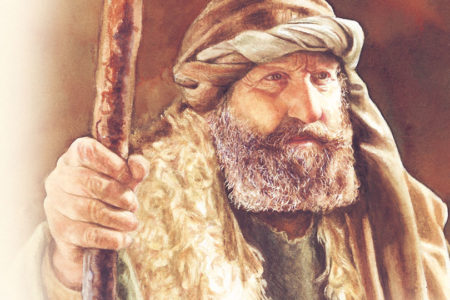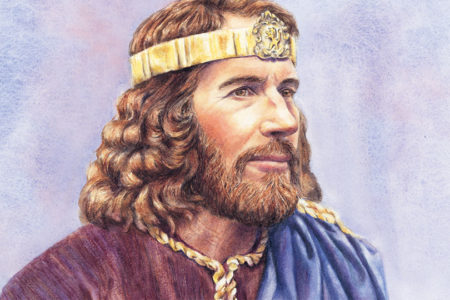The Wages of Sin
Hosea 10:1-15
Sin is like a moral cancer, infecting everything it touches. If you do not deal with it, it will corrupt you totally. What is true of moral corruption in man is also true in nations. When God confronted Israel about her spiritual and moral malignancy, the nation refused to deal with it. In chapter 10, Hosea traced the pattern of sin that ultimately resulted in the nation’s demise.
Sin Denounced
Hosea continued to speak of Israel’s sin in agricultural terms. Israel is described as “an empty vine.”
He bringeth forth fruit unto himself; according to the multitude of his fruit, he hath increased the altars; according to the goodness of his land, they have made handsome images (v. 1).
The word empty in Hebrew means “luxuriant” and refers to the overflowing abundance of fruit Israel enjoyed during the days of Jeroboam II. However, the Israelites attributed their prosperity to the false gods of Baal rather than to Jehovah. And the more they prospered, the more extensive and elaborate became the idols they made.
Hosea called Israel double-minded. “Their heart is divided; now shall they be found faulty. He shall break down their altars, he shall spoil their images” (v. 2). The word divided means “smooth, tricky, treacherous, slippery, deceitful, unreliable speech.” Israel’s speech and approach to God was hypocritical—divided and deceitful. She tried to worship both God and Baal. Ultimately, this dual allegiance provoked God to destroy Israel’s altars, images, and false religious system.
In verse 3, Israel realized that no one could deliver the nation in time of war. “We have no king, because we feared not the LORD; what, then, should a king do to us?” Upon reflection, the people knew that not even a king would be able to rescue the nation from judgment. The Assyrian invasion resulted in the destruction of Israel’s political power and the removal of her king. Afterward, Israel realized that her lack of reverential faithfulness to God was the reason for her judgment.
Lack of faithfulness to God also spilled over to a lack of regard for individual rights. The Israelites and their kings made legal agreements with no intention of honoring them. “They have spoken words, swearing falsely in making a covenant; thus judgment springeth up like hemlock in the furrows of the field” (v. 4). Verbal duplicity in regulating citizens’ rights produced a breakdown in justice. Lawsuits sprung up quickly and plentifully, like hemlock (poisonous herb) that grows in a fallow field.
Israel knew that judgment was imminent and feared the loss of her calf-idol:
The inhabitants of Samaria shall fear because of the calves of Beth-aven; for its people shall mourn over it, and its priests that rejoiced on it, for the glory of it, because it is departed from it. It shall be also carried unto Assyria for a present to King Jareb; Ephraim shall receive shame, and Israel shall be ashamed of his own counsel (vv. 5-6).
It was customary for a conquering army to carry off the gods of its defeated foe, thereby demonstrating the strength and superiority of its own gods. The idols would be melted down and presented as a gift to King Jareb. No record exists of an Assyrian king named Jareb. The phrase King Jareb means “warrior king” and is a figurative title for the king of Assyria, who was the final subjugator of the kingdom of Israel. Israel was disgraced and put to shame (v. 6) because she trusted in idols who were powerless to protect her in time of war.
Assyria showed no mercy to Israel. The Assyrians stripped the land of everything:
As for Samaria, her king is cut off like the foam [splinter of wood] upon the water. The high places also of Aven, the sin of Israel, shall be destroyed; the thorn and the thistle shall come up on their altars (vv. 7–8).
Samaria’s king was swiftly carried away like a splinter of wood on a tumultuous sea. Everything was destroyed and removed: idols, high places, and the wicked monarch. Thorns and thistles grew up, covering the site where the shrines and altars once stood. When Israel entered Canaan, the Lord commanded the nation to destroy idolatrous sites of worship (Num. 33:52; Dt. 12:2–3); but Israel failed to obey the Lord’s command. Thus God used a foreign army to destroy idolatry in Canaan.
In despair and anguish, the people cried for the mountains and hills to cover them (v. 8). They preferred death to being captured by Assyria. Yet God did not answer Israel’s cry. Unbelievers will make a similar plea when they experience the terror of God’s wrath during the future Tribulation (Rev. 6:16).
Israel’s sin is compared to that of Gibeah: ”O Israel, thou hast sinned from the days of Gibeah; there they stood; the battle in Gibeah against the children of iniquity did not overtake them” (v. 9). The incident Hosea referred to is recorded in Judges 20:1–48. Israel almost destroyed the entire tribe of Benjamin for sheltering the wicked men of Gibeah who brutally raped a Levite’s concubine. Israel experienced the same fate when the Assyrians invaded the country.
God said, “It is in my desire that I should chastise them; and the people shall be gathered against them, when they shall bind themselves in their two furrows” (v. 10). God determined the time when He would punish Israel for her sin. The phrase when they shall bind themselves in their two furrows is better translated, “when I (God) shall bind them for their two transgressions.” The meaning is difficult to interpret. Some believe the phrase refers to Judah and Israel yoked together in evil (like plowing oxen) before God’s eyes. Others interpret it to mean Israel is yoked to the two golden calves set up in Dan and Bethel. Still others believe the phrase refers to Israel’s former sin at Gibeah and her priest’s sin of idolatry. Whichever view one holds, judgment on Israel was certain.
Ephraim (Israel), who was deprived of her calf-idol, is compared to a heifer: “And Ephraim is like an heifer that is taught, and loveth to tread out the grain, but I passed over upon her fair neck; I will make Ephraim to ride; Judah shall plow, and Jacob shall break his clods” (v. 11). A young cow was trained to do easy work and allowed to be unmuzzled, so she could eat while threshing grain. In like manner, Israel lived in a comfortable land of plenty, able to indulge herself because of the prosperity God provided. Ephraim, however, failed to appreciate her situation under God’s covenant relationship and became yoked to immorality and idolatry. Therefore, God would place Israel under a harsh yoke that would chafe her fair neck raw. Both Israel and Judah would be yoked to their enemies and made to perform harsh labor. Plowing and harrowing was backbreaking work in a land like Israel with rocky, thin soil. This prophecy was fulfilled when the Assyrians destroyed Israel (722 B.C.) and Babylon took Judah captive (586 B.C.).
Salvation Announced
Although destruction hung over Israel, God still announced that judgment could be averted. Hosea said, “Sow to yourselves in righteousness, reap in mercy, break up your fallow ground; for it is time to seek the LORD, till he come and rain righteousness upon you” (v. 12). Fallow ground is land that has been plowed but left unseeded. During the growing season, it becomes hard and full of weeds. If Israel broke up the fallow ground of her hard heart, she would receive loving-kindness and mercy from God. But first, Israel needed to root out the noxious growth of sin that had overtaken her. Then the nation needed to seek the Lord earnestly and zealously, in true repentance. If Israel had responded in such a manner, God would have withheld judgment and would have rained righteousness on the nation.
To reinforce the need for sowing righteousness by repenting, Hosea reminded Israel of all the evil she had plowed:
Ye have plowed wickedness, ye have reaped iniquity, ye have eaten the fruit of lies; because thou didst trust in thy way, in the multitude of thy mighty men (v. 13).
But Hosea’s enumeration of Israel’s sin did not bring conviction on the people; neither did his call to repentance. Instead, Israel turned a deaf ear to the prophet.
Sentence Pronounced
Because Israel failed to respond to Hosea’s call to seek the Lord, the prophet had no choice but to pronounce judgment: “Therefore shall a tumult arise among thy people, and all thy fortresses shall be spoiled, as Shalman spoiled Beth-arbel in the day of battle; the mother was dashed in pieces upon her children” (v. 14). In the siege, people could hear the noise of war and confusion. All of Israel’s strongholds would be laid waste. The inhuman cruelty of the Assyrian army would be unleashed on the people, and none would be spared. Mothers would bend over their children to protect them but to no avail; both would be slaughtered.
Israel’s destruction is compared to Shalman’s devastation of Beth-arbel. Little is known about Shalman or the city of Beth-arbel. Many scholars believe that Shalman is a contracted form of Shalmaneser, the name of a number of Assyrian kings. Shalmaneser V, son of Tiglathpileser III, is the king to whom Hoshea of Israel became subject (2 Ki. 17:3) after he attacked Israel in 725 B.C.
Others believe Shalman refers to Shalamanu, a Moabite king who invaded Galilee and later paid tribute to Tiglath-pileser. Beth-arbel may well be Arbel in Galilee. In this context, the name Shalman probably refers to Shalmaneser.
The Assyrian invasion would bring an end to Israel. Hosea said, “So shall Bethel do unto you because of your great wickedness; in a morning shall the king of Israel utterly be cut off” (v. 15). Bethel, the center of all wickedness (representing every city in Israel), would be destroyed completely like Beth-arbel. At dawn’s light, when soldiers assemble for battle, King Hoshea would be cut off, thus ending the kingship within Israel. Israel’s misplaced confidence in its military, rather than in God’s power, was the nation’s downfall.
Failure to deal with her spiritual malignancy resulted in Israel’s inevitable judgment. God’s chastisement of Israel is an example and warning to each nation in every generation that forgets God. Through the apostle Paul, God reminds us today, “Now all these things happened unto them for examples, and they are written for our admonition, upon whom the ends of the ages are come” (1 Cor. 10:11).







